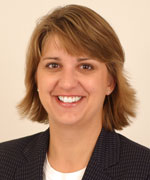12 Nov Online Learning at Huntington University
Steve Dennie, Communications Director
Huntington University is plunging into the world of online learning. They got their feet wet during the last several years with a Masters in Youth Ministry Leadership. Now, various other courses are being added through the EXCEL adult education program.

Julie Goetz (right) oversees Huntington University’s online classes. She spent three years working part-time with the online youth program. In June, she came aboard fulltime as the Coordinator of Online Programs. Which means she:
- Manages and reviews course content.
- Helps faculty transition their syllabus to an online course (which can be easy or difficult, depending on the course).
- Trains faculty on how to conduct an online course.
- Does strategic planning to advance the online programs.
- Works with LearningHouse.com, which hosts HU’s online classes.
- And does other stuff. Don’t we all.
Julie is a learner, too. Currently, she’s pursuing a Master of Education with a specialization in “instructional design for online learning.” Sounds relevant, don’t you think? So when online students contact her with questions or problems, she can respond with empathy, since she encounters some of the same issues.
Huntington could have used courses already developed by LearningHouse, and just add their stamp to it. But they wanted everything to be Huntington University owned-and-developed coursework. “We provide all of the information to LearningHouse,” Julie says, “and they format it–make it look pretty.”
What about students who aren’t tech-savvy?
“If you can add an attachment to an email, I think you can work through the website,” Julie says. “Since you don’t have face-to-face time, everything must be documented: ‘Step 1, do this. Step 2, do this.’ We make sure directions are clear and linear.” But if there are any problems, there’s always LearningHouse’s 24/7 support line.
First-time students need reoriented to the online paradigm. It’s a different way of thinking. A student will ask her, “When do I need to be online?” That’s a classroom-paradigm question. For online classes–you “go to class” whenever it’s convenient for you. It’s not a “time,” but a “window” of time.
Without the traditional classroom structure, students need discipline. For Julie in her Master’s work, that means staying late two nights a week. She could do everything at home, but the distractions (particularly of children) are too great.
Every week includes a discussion, where students “talk” about an assigned reading or topic (or whatever the professor wants to discuss). Students are required to not only respond to the professor, but to respond to comments from other students. That fosters a sense of community.
So does the Prayer & Share Café, where students can talk about things outside of class to get better acquainted. A daily Bible verse is uploaded, too. Students aren’t required to look at it, but it’s available.
Two EXCEL classes, “Introduction to Psychology” and “Life Science,” started in October. Three more courses run January-March, and another four March-May.

No Comments